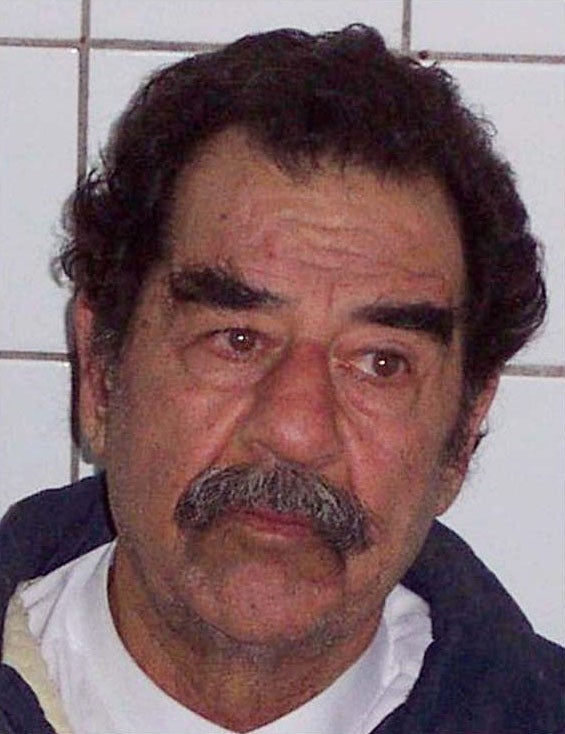Saddam Hussein ‘acted like Hitler’ when Iraq invaded Kuwait, Thatcher said
Iraqi president was described as ‘selfish, despotic dictator’, declassified documents reveal

Your support helps us to tell the story
From reproductive rights to climate change to Big Tech, The Independent is on the ground when the story is developing. Whether it's investigating the financials of Elon Musk's pro-Trump PAC or producing our latest documentary, 'The A Word', which shines a light on the American women fighting for reproductive rights, we know how important it is to parse out the facts from the messaging.
At such a critical moment in US history, we need reporters on the ground. Your donation allows us to keep sending journalists to speak to both sides of the story.
The Independent is trusted by Americans across the entire political spectrum. And unlike many other quality news outlets, we choose not to lock Americans out of our reporting and analysis with paywalls. We believe quality journalism should be available to everyone, paid for by those who can afford it.
Your support makes all the difference.Margaret Thatcher compared Saddam Hussein to Adolf Hitler following the Iraqi dictator’s invasion of Kuwait, previously classified documents from the start of the Gulf War reveal.
The Conservative prime minister and her foreign secretary privately agreed that Hussein was “behaving like Hitler” in 1990 after his military attack on the neighbouring country.
Thirty years on from Operation Desert Storm, which ended 30 years ago this week, the documents, which were first made public in 2017, underline how the premier viewed Hussein – as a “selfish, despotic dictator” who engaged in “psychological warfare”.
The assault was met with international condemnation and the UN Security Council imposed immediate economic sanctions on Iraq. Hussein’s invasion led to the Gulf War, through which a US-led coalition liberated Kuwait in 1991.
Downing Street private secretary Caroline Slocock sent a memo to foreign office aide Simon Gass on 19 August 1990 detailing how Ms Thatcher and Douglas Hurd had spoken about the developing military situation during a private conversation the previous evening.
Ms Slocock’s memo read: “Both the prime minister and the foreign secretary agreed that it now seemed highly likely that foreign nationals would be detained at key installations.
“Saddam Hussein was behaving like Hitler and using psychological warfare. His aim might well be to provoke hostile action. The prime minister stressed the importance of the UK studying his psychological warfare tactics carefully and responding in a suitable way.”
The note also disclosed that the colleagues had described Hussein as “a selfish, despotic dictator”, referring to the eight-year Iran-Iraq war in which hundreds of thousands of people died.
Files from the lead-up to the Gulf War also revealed that a foreign minister advised Ms Thatcher against launching a propaganda campaign against Hussein, as the tactic would lead to questions around why the UK had sold arms to Iraq, despite the atrocities committed during his reign.
Foreign office minister William Waldegrave wrote to the prime minister: “The more the government trumpets Saddam’s atrocities, the more the question comes up: Why did you go on doing business with him for so long?”
The previously classified documents, which are held at the National Archives in Kew, also show that Ms Thatcher and her successor, John Major, discussed the Gulf War later that year.
Mr Major wrote a letter to his predecessor on Boxing Day 1990, a month into his premiership, saying that he would “like to share with you the prevailing sentiment on the Gulf”.
The prime minister wrote that he was “in no doubt” that the Iraqi dictator’s actions were “unforgivable”, and that the UK “should not shrink from” conflict.
Records show that the two Conservative leaders met in early January 1991, shortly before combat began in Operation Desert Storm, to discuss the situation.
Mr Major’s letter in December also showed he believed that failing to remove the Iraqi military from Kuwait would lead to “prestige for Saddam Hussein; danger for other small countries; a greater danger from Saddam at a later date; and a huge loss of prestige for US and ourselves”, underlining that “none of these dangers are attractive”.
The war against Iraq included a coalition of 35 nations – the biggest military alliance since the Second World War.
Join our commenting forum
Join thought-provoking conversations, follow other Independent readers and see their replies
Comments